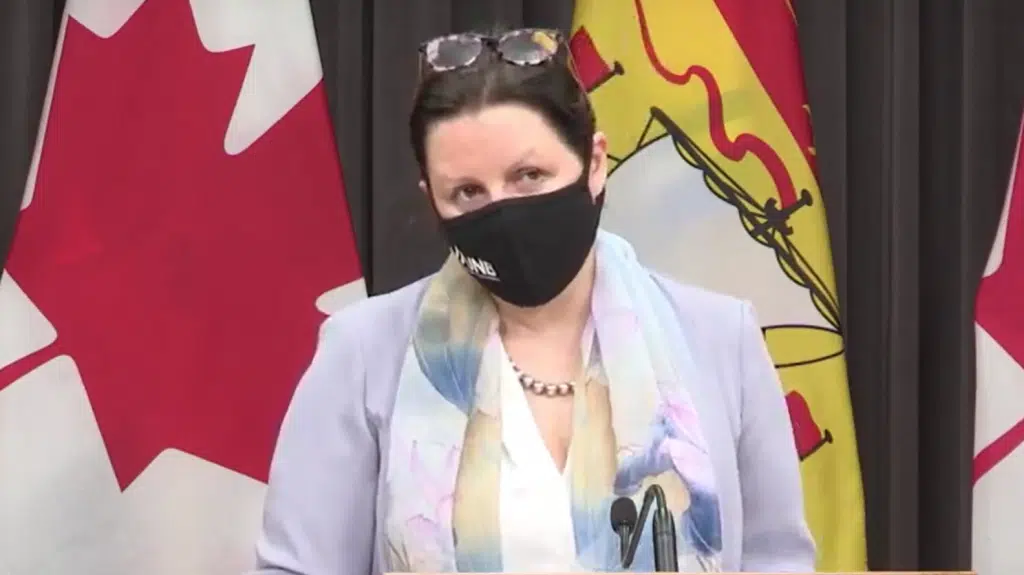
Dr. Jennifer Russell on Feb. 8, 2021, briefing. Image: GNB Youtube
The Moncton region (Zone 1) will move to the orange level of Covid-19 recovery, and the Edmundston region (Zone 4) will move to the red level, as of midnight Tuesday.
Edmundston been under lockdown for the last 15 days which has created many hardships, including less business activity, and schools have been closed.
New Brunswick chief medical officer of health Dr. Jennifer Russell says the hard work is paying off and recommended Zone 4 move to the Red Phase of pandemic recovery at midnight.

Health minister Dorothy Shephard reminded people in Zone 4 they need to stay with their household bubbles, but noted that more retailers can open now with an operational plan.
“Schools in Zone 4 will reopen this week,” she said, adding students in the Francophone district will return to classrooms Tuesday, and students in the Anglophone district will return on Wednesday.
In the meantime, Russell says Zone 1, which has been in the red level since January 20, will be moving to the orange phase also at midnight.
In orange, businesses such as hair salons, barbers and gyms can reopen and in-person dining can return to restaurants. Residents in Zone 1 can now have a Steady 10, including for dining at restaurants. However, restaurants will be asked to collect diners’ contact information for tracing.

Public Health reported two new cases of Covid-19 Monday, which Russell says is the lowest new case figure since New Year’s Day. Both of those cases are in the Edmundston region.
Shephard also announced that two Edmundston residents died this weekend because of “underlying conditions, including Covid-19.”
The province now has 182 active cases of the virus with seven individuals in hospital and two in intensive care.
Russell thanked those who have followed Public Health guidelines diligently. But she urged New Brunswickers to continue to follow guidelines especially as new variants of Covid-19 has multiplied the risk of transmission.
“This does not mean that the virus has been eradicated. It does not mean people can cast aside their masks and go back to life as it was before the pandemic and before the outbreaks. What this means is that the risk of transmission of Cvid-19 in these zones is less than it was two weeks ago, but it is not zero,” she said.
Russell said Public Health is still seeing transmission in workplace settings in Zone 1, which remains a significant concern.
Travel restrictions on rotational workers will also remain in place. Russell said while she understands how difficult it is for those workers and their families, the measures are necessary. She encourages New Brunswickers to show their support also.
“Please know that we would obviously love to avoid this situation but the risks are so very high right now,” she said. “I do hear how difficult it is, and I want to thank all the rotational workers and their families for these sacrifices that they’re making to keep New Brunswickers safe from Covid-19.”
Travel still brings a very high risk, Russell said. Even though the number of travelers haven’t changed much, the new variants means the risk has increased. She urges New Brunswickers not to travel during the March break, traditionally a time for families to go somewhere warmer.
“Travel outside of Canada is definitely not recommended and we would discourage travel to other provinces at this time. We also want to see less moving around in New Brunswick over the March break,” she said.
The vaccine rollout continues, despite a delay in sufficient supply. As of February 6, 10,352 of 27,000 healthcare workers in New Brunswick, including long-term care facility workers, have received at least one dose of the vaccine. More than 2,900 healthcare workers will get their second dose this week.
Out of 11,000 long term care facility residents, 2,840 have received at least one dose of vaccine.
Inda Intiar is a reporter with Huddle, an Acadia Broadcasting content partner.






